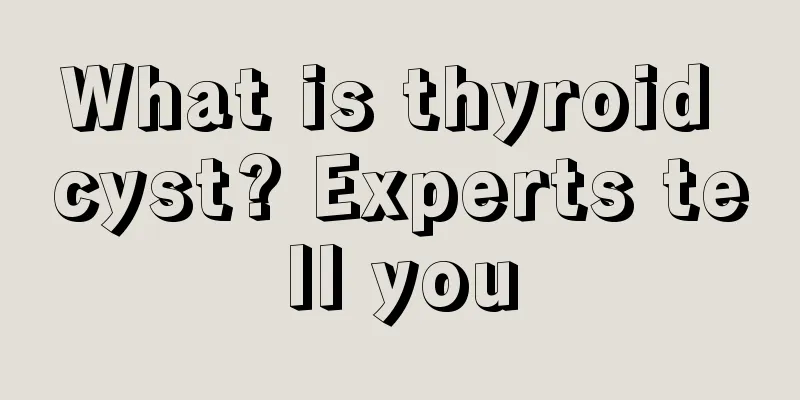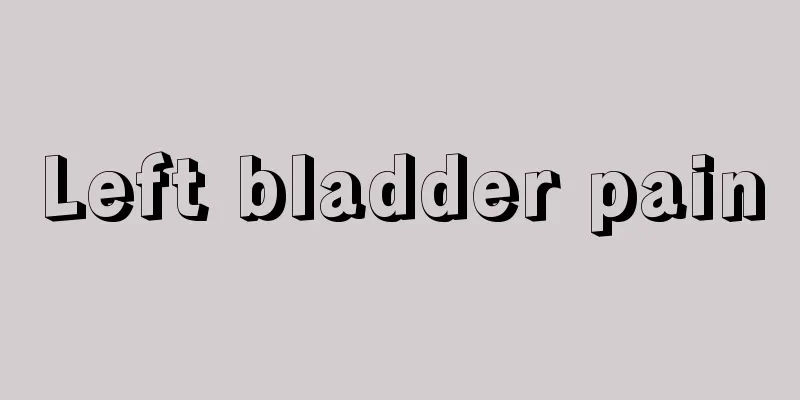What is thyroid cyst? Experts tell you

|
Thyroid cyst is a fluid sac in the thyroid gland. Generally, there is no pain symptom or the pain is not obvious. If the cyst is very large, some compression symptoms will appear, such as difficulty swallowing. In many cases, this is an endemic disease and is closely related to iodine deficiency. 1. Introduction to thyroid cyst A thyroid cyst refers to a sac-like mass containing fluid found in the thyroid gland. Thyroid cysts usually have no symptoms unless the cyst is very large or there is bleeding in the cyst, which may cause some compression symptoms such as pain, difficulty swallowing, difficulty breathing, hoarseness, etc. Generally speaking, thyroid cysts rarely contain malignant cells and usually only require observation to see if there is a tendency for them to grow larger. 2. Causes Thyroid cyst is an endemic disease mainly caused by iodine deficiency, which causes thyroid hyperplasia, thyroid cysts and degenerative lesions. Patients with thyroid cysts do not feel any discomfort and often discover the tumor in the front of the neck accidentally. However, to treat thyroid cysts, it is necessary to understand some of the causes of the disease, which is very helpful for the treatment of the disease. Thyroid cysts are sometimes caused by excessive liver fire in the body, or emotional injury, which causes liver qi to become depressed and thus trigger thyroid disease. Some are related to the menstrual period of some women, pregnant women, and women who have given birth. It is also related to some physiological dysfunctions and physical factors. Women are more susceptible to it. Thyroid cysts caused by this cause are mostly solid at first, but will turn from solid to virtual after a long time, or a mixture of solid and virtual. Thyroid cysts are sometimes also related to iodine deficiency in the body. As the body absorbs less iodine, the thyroid hormone concentration in the patient's blood will decrease. Through fluid regulation, the anterior pituitary gland will secrete more thyrotropin, thus forming a thyroid cyst. This is a phenomenon of thyroid hypofunction. Symptoms The symptoms of thyroid cysts mainly include palpitations, chest tightness, heat intolerance, sweating, hand tremors, insomnia, increased appetite, weight loss, fatigue, diarrhea, goiter and exophthalmos. The onset is relatively acute. The thyroid gland is enlarged and hard on one side or both sides, accompanied by local pain, which often radiates to behind the ears and the back of the head. The whole body may have chills and fever. It is more common in middle-aged women. The thyroid gland is mostly diffusely enlarged; some may appear as nodules, which are painless and have no systemic symptoms. Some patients have symptoms of hyperthyroidism, and those with long-term illness may have some symptoms of reduced thyroid function, such as decreased appetite, weakness, mild edema, etc. |
<<: How to regulate the diet for thyroid nodules? It turns out to be like this
>>: Nodular goiter, 5 common manifestations
Recommend
How should hemorrhoids be cleaned?
Hemorrhoids are a common anorectal disease in cli...
The difference between fixed dentures and removable dentures
Having white teeth can better maintain our image ...
What is the cause of hypokalemia
Hypokalemia is a common medical disease in clinic...
Several measures to prevent osteosarcoma
Clinically, osteosarcoma is a relatively frighten...
Tips to quickly get rid of bad breath
Bad breath is something we often encounter in our...
How to quickly hydrate your skin
Whether it is hot summer, cold winter, windy autu...
Note after successful IVF medication withdrawal
In vitro fertilization can meet the needs of many...
Electric oven baked fish
There are many ways to cook fish, and one of the ...
Glucose injection at night can sober you up
Glucose is a widely used drug, and the main role ...
Can Panax notoginseng powder be taken for a long time? Misconceptions about taking Panax notoginseng powder
In recent years, the health benefits of Panax not...
Do all beans contain estrogen?
Do all beans contain estrogen? The nutritional va...
Causes of headache after brain tumor surgery
If you experience a headache after brain tumor su...
How to deal with respiratory complications after lung cancer surgery
Surgery is the preferred method for treating lung...
What is the most important thing in marriage life
Most people are bound to get married when they re...
The difference between lip tattoo and lip bleaching is actually here
Lip tattooing and lip bleaching are common things...









